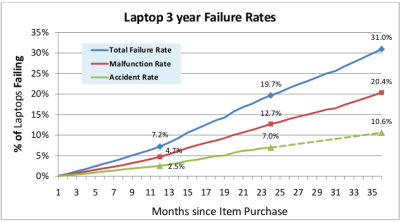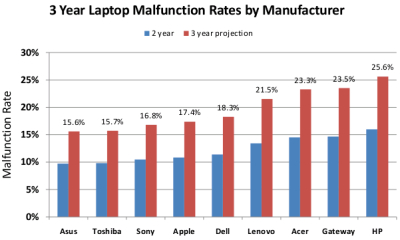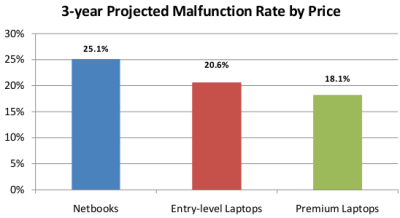
Is it worth it to buy an expensive laptop?
 It's
been a tough week since my horse laptop broke a leg hinge and the vet repair service said she had
to be put down
would cost as much to repair as replace. I am a very cranky
person when I have to baby my computer so that she doesn't fall in
half, and poor Mark has had to put up with my moodiness for long
enough. We decided to go ahead and get me a new laptop, then let
Mark try his hand at mending the hinge on this computer so that she can
be a good backup in case of future problems.
It's
been a tough week since my horse laptop broke a leg hinge and the vet repair service said she had
to be put down
would cost as much to repair as replace. I am a very cranky
person when I have to baby my computer so that she doesn't fall in
half, and poor Mark has had to put up with my moodiness for long
enough. We decided to go ahead and get me a new laptop, then let
Mark try his hand at mending the hinge on this computer so that she can
be a good backup in case of future problems.
 I
try to be nice to my laptops, but the truth is that I run through them
far faster than you would expect. Two years ago, I paid more for
a Lenovo laptop thinking that it would be sturdier than the HP laptop
I'd just broken, but the Lenovo turned out to last an even shorter span
of time. A
recent study
suggests that this lack of longevity on the part of laptops isn't
completely my fault, since nearly a third of all laptops fail in the
first three years. That said, there are notable differences
between manufacturers, with HP laptops failing at phenomenal rates,
Lenovo laptops coming in middle of the pack, and Toshiba and Asus
laptops lasting considerably longer.
I
try to be nice to my laptops, but the truth is that I run through them
far faster than you would expect. Two years ago, I paid more for
a Lenovo laptop thinking that it would be sturdier than the HP laptop
I'd just broken, but the Lenovo turned out to last an even shorter span
of time. A
recent study
suggests that this lack of longevity on the part of laptops isn't
completely my fault, since nearly a third of all laptops fail in the
first three years. That said, there are notable differences
between manufacturers, with HP laptops failing at phenomenal rates,
Lenovo laptops coming in middle of the pack, and Toshiba and Asus
laptops lasting considerably longer.
 The
question I'm soliciting feedback on is --- do you think it's worth
paying more for longevity when it comes to laptops? Based on the
length of warranty that Toshiba provides on their laptops, I suspect
their low end laptops last no longer than other low end laptops
(although maybe that's not a valid assumption, given the small
difference between entry-level laptops and premium laptops on this
chart and the larger difference between brands in the last
chart.) If the Toshiba Tecra laptop would survive about three
times as long as their low end Satellite laptop, is it worth paying
three times as much for that longevity?
The
question I'm soliciting feedback on is --- do you think it's worth
paying more for longevity when it comes to laptops? Based on the
length of warranty that Toshiba provides on their laptops, I suspect
their low end laptops last no longer than other low end laptops
(although maybe that's not a valid assumption, given the small
difference between entry-level laptops and premium laptops on this
chart and the larger difference between brands in the last
chart.) If the Toshiba Tecra laptop would survive about three
times as long as their low end Satellite laptop, is it worth paying
three times as much for that longevity?
We'd save pain and
suffering by going for the more expensive model, and would also save
the environmental cost of creating three laptops instead of one.
On the other hand, the industry's planned obsolescence of the low end
laptop works to the consumer's advantage in a different way since you
tend to be able to buy more computing quality every year for your
dollar. What do you think? Expensive Toshiba, cheap
Toshiba, or cheapest laptop that has the computing power I need?
Want more in-depth information? Browse through our books.
Or explore more posts by date or by subject.
About us: Anna Hess and Mark Hamilton spent over a decade living self-sufficiently in the mountains of Virginia before moving north to start over from scratch in the foothills of Ohio. They've experimented with permaculture, no-till gardening, trailersteading, home-based microbusinesses and much more, writing about their adventures in both blogs and books.
Want to be notified when new comments are posted on this page? Click on the RSS button after you add a comment to subscribe to the comment feed, or simply check the box beside "email replies to me" while writing your comment.

I considered going back to a desktop, but finally decided I'd rather put up with buying a computer more often rather than losing the mobility.
We tried gluing a hinge on the last computer I broke, but the closing action of a laptop is extremely complicated and seems not to match any hinge we can find. Rather than closing like a door, the laptop lid slides in and back as it closes --- very annoying.
I look at this less on the level of the whole laptop, and more on the level of individual parts that are likely to break. So I avoid laptops with cooling fans, which are guaranteed to die; I get a SSD rather than a spinning disk, which is likely to not last (although it's at least easy to replace a disk), and I like to factor in the costs of replacement batteries and power bricks.
I have to wonder if you keep breaking hinges because your laptops have such large screens that involve more force. I've never had problems with hinge quality over a dozen years of using smaller laptops. Most recently, laptop keyboard build quality has been a problem for me. Before that, I had a run of bad luck with their power plug sockets.
I've felt for a while that the best workaround for shoddy build quality was to not worry about it beyond easily fixed parts, and just buy 2 of the same netbook, using the second as a source of spare battery and power supply, and swapping to using it when the first wears out (and then using the first for parts to prolong the life of the second). That comes out cheaper than buying eg, a replacement keyboard, battery, and power supply.
here's a good round-up of 2010's best laptops.
http://gizmodo.com/5697590/the-best-notebooks-of-2010
for durability and the "it just works" factor, i'd consider a macbook air or pro 13 - both have aluminum unibodies.
personally, i'm more inclined to recommend you go with an ASUS Eee PC 1215N. from watching friends use their ASUS netbooks in industrial warehouse, artist'd communes for the last four years, i'm pretty sold on their durability. this machine is below $500 but offers a nearly full sized laptop's features and performance. it also has a pretty outstanding battery life.
Edward --- I think you're clearly right, based on the chart in this post. HP laptops failed nearly twice as much as Toshiba laptops over the time frame of the study!
Joey --- That's an excellent point about the laptop screen size. I've been wondering why I keep breaking the same part --- I've really started trying to take better care of the laptop screen in the last couple of years and was shocked to hit the same problem again. But I'm leery of downsizing to a smaller screen because I love my full-size keyboard... I like your idea of buying two of the cheapest kind, although if the hinge breaks again, I don't know that I'd feel safe swapping one out from the other computer --- it seems like hinges are expensive to replace primarily because even the pros are afraid of taking them apart and instead send them back to the manufacturer to be repaired.
Kevin --- Thanks for the link and the feedback! I tend to skip Macs because I run linux, and it doesn't seem worth it to pay extra when I'm not using their operating system. The ASUS certainly do seem to get good reviews, but when I look into them, they also seem to be a lot pricier than a comparable Toshiba (which is already pricier than a comparable HP). I can't seem to find any ASUS on sale, which makes me less prone to go that route.
Laptop hinges are difficult because the hinges also have to contain the power and signal connectors to the LCD display. And there's not a whole lot of room to work with.
BTW, if you google for 'laptop repair DIY', you'll find lots of addresses for spare parts and info on how to repair them yourself. E.g. at ifixit.com. Fixing PC's is generally not difficult. It's just a box of high-tech LEGO. While it is true that laptops are more closely packed than
desktops, they are made to be assembled easily.
While it is true that laptops are more closely packed than
desktops, they are made to be assembled easily.
If you want a tougher laptop, maybe you should have a look at the Panasonic Toughbooks? They're supposed to be quite sturdy.
But the sad part is that a computer is likely considered obsolete in five years, so they're not built to last.
I would look into the smaller brands that build to order. I was able to choose e.g. the motherboard, graphics chipset, processor type, harddisk size/speed and buy a laptop without windoze from a local supplier. In the shop I was able to test as similar model to check that it worked with FreeBSD, my OS of choice.
My son swears by Mac. What he does if he has a lot to do is plug in a larger monitor and on occasion a keyboard, but this is seldom done and he and his wife have no problems with theirs. Being teachers they use them constantly and keep telling me I should get a Mac laptop because of all the trials an tribulations I've had with the desktop I have.
They use theirs for school work, presentations and running peripheral things they plug into their Macs.
They replace theirs every 3 to 4 years.
Roland --- I looked into Toughbooks, but they were over a thousand bucks to get the same computing power I have now and which I can get in a Toshiba for under $400 or from an el cheapo brand for under $300. I couldn't quite stomach spending so much money on a laptop....
We'd be willing to change out a lot of other parts on the laptop, but the hinge just has me running scared...
Vester --- Three or four years isn't that great a life span --- I suspect they like the Macs because of the user friendly operating system. That's what most people love them for.
Some people like Macs for the easy-to-use GUI, and because they get all the stuff they want (iPhoto, Mail, iDVD, iMovie, GarageBand, etc) with them. They're very simple for people who lack technical knowledge, and pretty hard to muck up.
But they're also very popular with the geek crowd. I love mine because it's Unix underneath. And OS X just stays out of your way, allowing you to get the real stuff done. I've never had to stuff around with drivers, apps, updates, etc like I have with Windows and Linux. You can probably find OS X ports of all your Linux apps.
My MacBook is just over 3.5 years old, and still running fine. It still has the speed to run the latest OS version and all the latest apps smoothly. I expect it to last another 1-2 years, maybe more, and will probably replace it with a Mac Mini when it eventually dies.
Just a thought.
I'm probably jinxing myself by writing this, but I've never had any trouble with hps. I got my first hp laptop in 2001, used it until 2007 -- got a new one because mine was getting so slow, not because it stopped working. It stills works. Love my new hp laptop which knock on wood! is still working great. Brian's first hp laptop died an early death, but that was because he spilled tea with honey into it, so that's hardly the laptop's fault. His second seems to be just fine. Knock on wood, once again. I guess that's just anecdotal evidence though.
Happy Thanksgiving!
Honestly, my HP laptop lasted longer than my more expensive Lenovo laptop too, but I figure you and I must have just gotten lucky.
I finally decided on a Toshiba since I found one that had the same processor speed and memory and more hard drive space than my current laptop for only $330 (free shipping), versus the $800 I originally spent on my Lenovo. (I hadn't even seen any HPs with similar specs that low, or at least not ones I wouldn't have to brave physical stores for.) I would point you to the deal, but it was a "lightning" Amazon deal which was over in about three minutes. I hope the Toshiba does at least as well as this laptop!